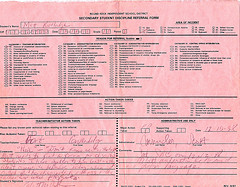Every high school class is familiarized with that one particular classmate who likes to give his or her teacher a hard time. However, a teacher does not have every right to report that behavior as “insubordination.”
“[Insubordination is when] a teacher asks you to do something reasonable and you refuse to do it,” Principal John Dodig defined. The most common example of insubordination in Staples involves the refusal to discontinue cell phone use.
While students commonly get caught using their cell phone during class almost every day, insubordination itself is not common in the Staples community. Dodig believes that this is due to two factors: the population of students, and the fact that teachers know how to handle asking students to do things.
“We’ve made a considered effort to treat you kids with respect, and what I’ve noticed is it’s usually given back, which is [also] why I think we don’t have a tremendous amount of insubordination cases,” Dodig said.
If a student were to get in trouble for this behavioral act, however, he or she would be sent to the assistant principal’s office rather than the principal’s.
Patrick Micinilio, the assistant principal to the class of 2013, explained how insubordination is open defiance of any teacher or school employee. This includes people such as Patty McQuone and the lunch ladies.
“When you work with students for four years, you set a standard,” Micinilio said as part of the reason why there are so few insubordination cases in Staples each year.
Punishment for this behavior can range from detention for refusal to stop texting, to an in-school suspension for harsh profanity towards a teacher.
Current Staples students are not likely to get sent to their assistant principal for insubordination. However, Richard Franzis, the assistant principal for the class of 2014, recalled that that was not always the case.
“I’ve been here 12 years, there used to be a lot more of [insubordination related] behavior back then than there is now,” Franzis said. He stated that students usually get sent his office for behavior that is not over the top, but occasionally it does happen in school.
While open defiance of school employees is not common in this school, the word “insubordination” is frequently misused. A student who is being “sassy” or “silly” in class or to a teacher would not be considered open defiance by the school according to Franzis.
Insubordination and its consequences are defined in the Staples Student Handbook, which all students recieve at the beginning of the school year, and is not tolerated by teachers or other school employees.
While most students will never be punished for this action, many are unaware of insubordination rules.
Devon Lowman ’13 had no idea what insubordination was until recently; many of his fellow students are in a similar situation.
“A lot of students just text during class and they don’t really have any regard for what they are doing, so either they don’t care or they don’t know [about insubordination},” Lowman said when reflecting on students who display this behavior. He believes this situation arises because students do not take the Handbook seriously.
“Does [the school] really expect anyone to read the handbook?” said Lowman.
And while students signed, saying they have read the handbook, it seems as though not every student has been informed of school rules, code and proper behavior the handbook addresses.















































hafsa • Feb 3, 2016 at 9:57 pm
i dont what happen